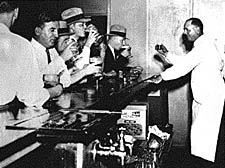|
|
 |
| |

A ‘speakeasy’ in prohibition America |
Bootlegging and the American Dream
Two families have dominated US winemaking since Prohibition
The history of American wine has been a heroic struggle to produce anything drinkable, marked by the conflict between those who saw wine as part of a republican agrarian economy and those interested in mass urban markets.
Even now this commercialism continues to co-exist with agrarian ideals. Alice Waters, owner of the fabled Chez Panisse restaurant in Berkeley, California, with its unashamedly French commitment to local and regional produce, asked Bill Clinton in 1992: “How can we teach basic human values – such as courtesy, civility, honesty and generosity – if eating is little more than refuelling, devoid of any seasonal, agricultural or social context?”.
The respective careers of the Mondavi and Gallo families illustrate these conflicts. Both come from Italian American parentage, starting their businesses before World War I, the Mondavis with an interest in growing grapes and the Gallos as saloon owners.
As viticulturalists, the Mondavi family were less badly affected by Prohibition in the 1920s. The Gallos, on the other hand, split between growing grapes and bootlegging: one brother went to jail while the other struggled, having lost heavily in the stock market crash of 1929.
Two and a half years into the Depression, Ernest and Julio’s father Joe, saddled with debt, shot his wife then himself. Had he lived a further six months, he would have seen Prohibition repealed. Ernest and Julio were now free to set up a legitimate wine business. Ernest was the marketing man who promised his brother that he would sell all the wine that Julio could produce. Their subsequent story combines the American Dream with the harsh realities of corporate life.
It was a struggle to build up their large operation after the negative image of bootlegging and their wines’ reputation as cheap liquor.
They maintained the infamous Thunderbird brand, laced with lemon juice and cheap port, a throwback to Prohibition moonshine. They never accepted the revolution in American tastes accompanying post-war prosperity.
They remained aloof from claims that wine might be more than just a commodity.
Quality improved from the 1980s onwards. But only when their grandchildren took over the business in 1993 was the Prohibition image laid to rest. By then, Gallo wines accounted for one out of every four bottles sold in the USA, an astonishing marketing achievement.
The split between the brothers Peter and Robert Mondavi had more to do with a family dispute. Robert, driven out of the family business, opened the first new winery in Napa Valley since before Prohibition. His vision was to compete with the best French châteaux. Mondavi’s Winery introduced tastings, guided tours, art exhibitions and concerts, to become the top tourist attraction in the Valley.
Robert was a visionary with an entirely new approach, culminating in a partnership with Baron Philippe de Rothschild in 1975 to produce the hugely prestigious Opus One wine. His later, controversial joint venture into Tuscany with the Frescobaldis is depicted in Mondovino.
In this transformation soil and climate gave way to technology and marketing. The relationship between them changed.
Yet, despite its influence on a global wine market, this transformation came out of a love of French wines.
California lacked European snobbery. It helped to raise standards. It has peppered the Golden State with joint ventures involving many European names. The appearance of wines from outside Europe on British tables is welcome. Mondavi wines came as a pleasant surprise.
But Hugh Johnson’s prediction that “the days of the nondescript are numbered” may be premature.
Gallo are now importing French wine to create the sort of international brand Opus One symbolised. Mondavi, who tried to expand through joint schemes at a time when grape prices were falling and beer and spirit companies moving into the wine market, has seen his company sold, leaving him with the honorary title of ‘Brand Ambassador’.
More generally, the boundaries between old and new are now less distinct.
But this doesn’t remove the more significant divisions between large and small producers, brand and place, global and local.
This is as true of California as it is of France. |
 |
|
| |
|
 |
|









